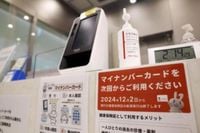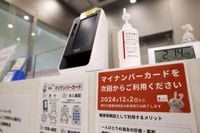On May 8, 2025, the National Federation of Insurance Medical Associations (Hodanren) released troubling findings regarding the MyNa insurance cards, which integrate health insurance functions into Japan's My Number cards. The survey revealed that a staggering 31% of these MyNa insurance cards have expired, leading to significant barriers for patients seeking medical examinations.
The survey, conducted between February and April 2025, involved responses from 9,741 medical institutions affiliated with Hodanren. Alarmingly, about 90% of these institutions reported encountering various issues since December 2024. The most prevalent problem was that patient information read from the cards was garbled, affecting 65.1% of cases. This issue has raised concerns among healthcare providers about the reliability of the MyNa insurance cards.
Hodanren highlighted that the expiration of the electronic certificate within the MyNa cards has resulted in increased difficulties for patients. Many individuals have faced challenges in accessing medical services due to the invalidity of their cards. The association is advocating for the revival and concurrent use of traditional health insurance cards, arguing that this would alleviate the current complications.
"The expiration of the electronic certificate has led to an uptick in troubles such as patients being unable to receive care," said a representative from Hodanren. They emphasized the need for a solution, urging that the issuance of conventional health insurance cards should be reinstated to allow for dual usage alongside the MyNa cards.
The validity of the electronic certificate on the MyNa card is five years, with a grace period of three months post-expiration during which it can still be used. However, Hodanren is concerned that as more cards expire without renewal, the number of patients facing access issues will continue to rise.
In the face of these challenges, approximately 80% of medical institutions indicated that they have been verifying patients' eligibility for medical care using traditional insurance cards when problems arise. This workaround has become crucial as patients navigate the complexities introduced by the MyNa insurance cards.
These findings come at a time when the integration of technology into healthcare is being increasingly scrutinized. While the intention behind the MyNa cards was to streamline processes and enhance efficiency, the reality appears to be quite different for many users. As the healthcare system adapts to these changes, the voices of medical professionals and patients alike will be vital in shaping the future of health insurance in Japan.
In summary, the survey results paint a concerning picture of the current state of MyNa insurance cards. With a significant percentage of cards expired and ongoing issues affecting patient care, the call for a return to traditional health insurance cards is gaining momentum. The need for a reliable and effective healthcare system is more pressing than ever, and stakeholders must work collaboratively to find solutions that prioritize patient access and care.


